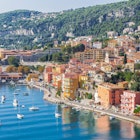

Some of Bucharest's architectural highlights are found in the Old Town © Monica Suma / Lonely Planet
Lonely Planet Local Monica Suma recently moved back to her native Bucharest after 12 years abroad. Drawn by the urban revival and cultural effervescence, this former New Yorker enjoys strolling through the back alleys of interwar Bucharest, searching for the hidden haunts, delicious eats and ever-present festivals.

My favourite places in the city… usually involve food and architecture, both of which Bucharest does very well. The Romanian Athenaeum (home to the George Enescu Philharmonic Orchestra) is my favourite landmark, but I also love the belle époque villas and stately Neo-Romanian mansions, found in abundance in the city. Many of them come with garden bars, something I missed dearly while living abroad. I’m a foodie, always on the lookout for the newest cafes and restaurants, but I equally love seeing historical monuments converted into cultural centres such as ARCUB Gabroveni or Point Art Hub.
When I have friends in town… I take them on a foodie tour sprinkled with art and architecture, in venues they wouldn’t easily find on their own. This includes street art, passageways and spruced-up landmarks like the Palatul Universul building, where we stop for ‘botanical cocktails’ at Fix Me a Drink. I show them how diverse Bucharest is, switching from a low-key flea market in Vitan-Bârzești to an architectural tour in a historically evocative neighbourhood like Cotroceni. They get a covrig (the Romanian pretzel), an éclair from French Revolution and a compulsory visit to Caru’ cu Bere, the oldest brewery in town which still flaunts a timeless decor. I also advise them to visit Ceaușescu’s former residence, known as the Spring Palace, and the National Village Museum.

On a typical weekend… I start with a speciality coffee at one of my favourite coffee shops: Origo, Orygyns Specialty Coffee, or Trofic which also serves amazing healthy food. With Bucharest’s booming third-wave coffee scene, the options are endless. Afterwards, I hit an exhibition or a festival, which often includes food and drinks with friends, or attend a show, be it a theatre performance or a concert of some kind. Sundays are great for brunch at Simbio and art gallery hopping. More recently, I’ve started going to lesser known museums like the Frederic and Cecilia Cuțescu-Storck Art Museum and watching independent movies at Cinema Elvire Popesco, housed in the beautiful French Institute.
When I meet friends for a drink… I usually choose between a rooftop, garden terrace or wine bar, depending on the season. Rooftops have become increasingly popular in recent years – Linea/ Closer to the Moon is my favourite due to its city views – but bohemian garden bars, such as Grădina Eden and Dianei 4, remain the uncontested Bucharest institution. Craft-beer bars have also been popping up at a rapid pace; the latest hip addition is the Danish Mikkeller, housed in a spectacular 20th-century villa on Charles de Gaulle Square. As Romania is Europe’s sixth biggest wine producer, wine bars like Pâine și Vin are another good alternative.

When I need to relax… a trip to Therme usually does the trick. It’s one of the largest wellness centres in Europe, and a day spent there is pure rejuvenation. With several thermal-water pools, a lot of exotic plants that give it a botanical garden feel and various aqua-gym activities, it’s a great escape from the usual city chaos. Otherwise, the city’s many parks are always a welcoming refuge of greenery.
On a sunny day… I head to Herăstrău Park for a run or go exploring new areas. Come dusk, the lakeside restaurants on Herăstrău Lake are the perfect spot for a sundowner. Closer to home, I never bore of exploring my own neighbourhood, Icoanei, which preserves the look and feel of interwar Bucharest. I find it calming to peek through the ivy-covered houses hiding large courtyards or to read a book in Ioanid Park, and visually inspiring to admire the architectural variety of the area, with Neo-Romanian, modernist and art deco houses.

To splash out… head to The Artist, Bucharest’s most popular fine-dining restaurant. It’s an outstanding molecular-food venue taking inspiration from Romanian cuisine – everything tastes as beautiful as it looks, at maybe half the cost you’d find in western Europe. For a more intimate experience, Beca’s Kitchen is my go-to place. The food is excellent and the owner-chef always greets you with a hug. The Puțul lui Zamfir street in Dorobanți is another option for foodies to indulge, with plenty of restaurants.
For cheap eats… I often go for a one-leu covrig with roasted sunflower seeds at the omnipresent patisseries across the city or a get kebab from Dristor Kebab. For Romanian food, a few mici (grilled skinless sausages) are a must; they’re found on most restaurant menus or at farmers’ markets like Obor. La Prăvălescu is a stunning deli that serves natural foods, great cakes and sandwiches. My latest discovery is Gedo Restaurant, serving hearty Sudanese fare and pastries for a steal. Burger Van sells juicy burgers averaging 25 lei, while Ciorbărie is my favourite spot for ciorbă de burtă (tripe soup) – they serve large bowls of soup and half-sandwiches equally cheaply.

What I like most about Bucharest… is how eclectic the city is. Unlike bigger European capitals on well-trodden paths, Bucharest hides an enormous potential for urban development. People often associate Bucharest only with the totalitarian-era Palace of Parliament, one of the world’s largest buildings, but it has a wealth of art nouveau villas and a huge amount of modernist architecture. This is also one of the best cities for urban exploration, full of abandoned buildings of incredible beauty in decay (like Adevărul, a historic newsroom) that are easy to discover with a guide or on your own if you practice caution (ie wear hiking boots). The food and drinks scene is ever-expanding and the Internet speed is one of the best in the world. In terms of value for money, Bucharest has a lot to offer.
You know you’ve been in Bucharest too long… when you find it normal to walk on the road instead of sidewalks where cars are randomly parked. Similarly, spending an hour in traffic for what would normally take 10 minutes becomes a day-to-day reality.
Explore related stories






 Destination PracticalitiesThere’s something fun in every season in the Florida Keys
Destination PracticalitiesThere’s something fun in every season in the Florida KeysDec 21, 2024 • 3 min read












